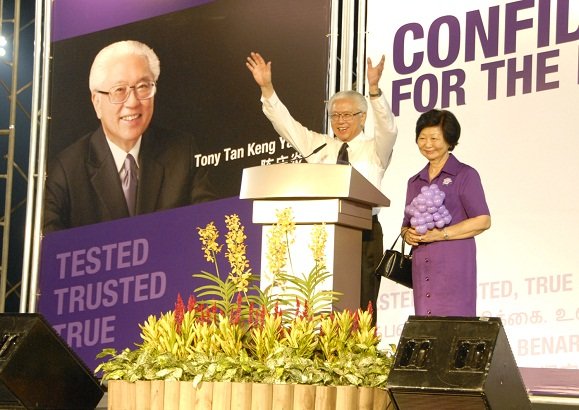Martin Abbugao

President-elect Dr Tony Tan makes his victory speech
Singapore’s voters gave the ruling party a “major wake-up call” in weekend elections, with critics feeling more and more empowered and no longer afraid to speak up for change, analysts said Sunday.
The results of Saturday’s presidential vote, in which Tony Tan, seen as a proxy for the People’s Action Party (PAP), scraped to victory, showed the government needed to evolve and be more open if it wanted to stay in power.
The vote was essentially a spill over of the voter discontent seen in May, when the opposition made a historic breakthrough in legislative elections and prompted Prime Minister Lee Hsien Loong to reshuffle his cabinet, they said.
“It’s an indication that support for the PAP is not so strong,” said Reuben Wong, an assistant political science professor at the National University of Singapore, after results showed Tan secured just over 35 percent of the vote.
“They have to figure out whether they need to reorient themselves away from the old-school authoritarian conservative PAP towards something that’s more mainstream Singapore, more liberal, more plural, more open to different ideas.”
Bridget Welsh, a political science professor at the Singapore Management University, described the result as “another major wakeup call for the PAP”.
“Tony Tan is the PAP of old, tied to LKY and its conservative roots,” she said, referring to Lee Kuan Yew, the stern founding father of modern Singapore and its first prime minister.
“The PAP has to shed its LKY skin and evolve into a less authoritarian animal that all Singaporeans can connect to.”
Former deputy prime minister Tan, 71, only narrowly escaped defeat after a recount early Sunday gave him a margin of just 7,269 votes over his closest opponent out of more than two million valid ballots cast.
Nearly 65 percent of voters cast their ballots for candidates who had been critical of the PAP.
Song Seng Wun, a Singapore-based economist with financial group CIMB, said the scale of the vote against Tan in the four-way race for the largely ceremonial post was significant.
“Only one in three voters chose the winner who is closely associated with the government. Two out of three chose somebody else and that’s quite telling.”
“It shows that the stranglehold of the PAP is no longer as firm as it was in the last four decades,” he told AFP.
Although the presidency is seen as a non-political role, the poll was seen as a direct referendum on the PAP, which has ruled Singapore for 52 years, because of Tan’s close links with the party and its top leaders.
Song said that the number of people who believed that “the PAP knows best” was declining and the younger generation, who have increasingly making their voices heard through the Internet, were pushing the boundaries.
“You now have a growing group of people with greater political awareness and maturity who are no longer afraid to speak up,” Song added.
Facebook, YouTube and Twitter have been credited with helping the younger generation bypass restrictions of a pro-government media as the wealthy city state evolves from strict political control to a more open democracy.
Under the PAP, Singapore has risen rapidly to become one of Asia’s wealthiest societies and Singaporeans had a gross domestic product (GDP) of nearly $50,000 per capita in 2010, one of the highest in the world.
Critics, however, say that economic growth has come at the expense of certain political freedoms, and there is a general reluctance to question policies because the government supposedly knows best.
But rising living costs, soaring housing prices, a widening income gap, and a liberal policy on foreign workers blamed for jobs being taken from locals have galvanised support for the opposition.
The PAP lost an unprecedented six seats out of the 87 at stake in May’s general election and its share of the vote fell to an all-time low of 60 percent from nearly 67 percent in the previous election in 2006.
Song said that faced with a politically more mature population, the PAP would have to shed its “we know best” image.
“The process of engagement going forward must also change because the kid is not a kid anymore,” he said.
—
Photo courtesy of The Online Citizen. This article was first published by AFP on 28 August 2011.

